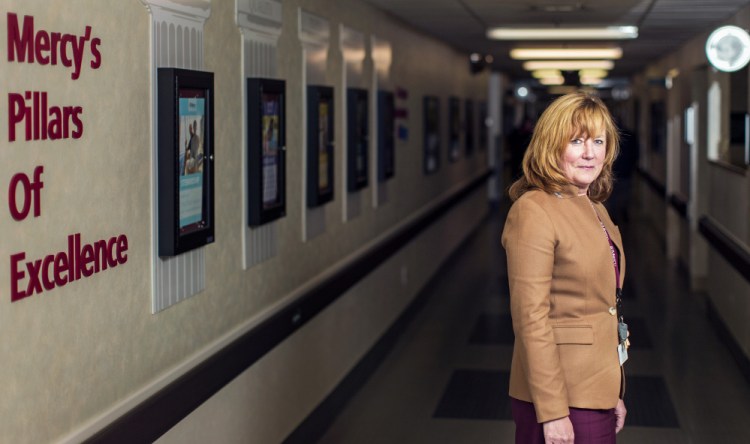A contingent of Portland officials from Mercy Hospital, city government, nonprofits and charities will head to the White House Thursday in an attempt to secure a “five-year multimillion dollar investment” for the region’s efforts to combat the opioid epidemic.
Officials say the Greater Portland Addiction Collaborative has an excellent chance to be selected for funding as part of the White House’s “Pay for Success” program that connects nonprofits with private investors who want to fund worthwhile causes.
The collaborative has been working for nearly a year on a comprehensive plan that includes a substantial expansion of sober housing to give recovering addicts a stable, supportive place to live.
Melissa Skahan, a vice president at Mercy Hospital who has spearheaded the collaborative’s efforts, said she has been communicating with the White House’s “Pay for Success” program for months and has visited the White House twice since the spring.
The Greater Portland group already has landed $400,000 from the Sisters of Mercy, a Roman Catholic religious order, for new sober housing in the Portland area, starting with a 12-bed recovery home for women that is expected to open by the end of the year. Rents in the home will be more affordable – $500 per month for clients – than rents for recovery homes, which often cost about $800 to $1,000.
Soon to follow will be a second site for expansion of recovery homes, and future sites will serve both men and women.
Skahan said the recovery homes help people focus on beating their addictions, and it’s one piece of a larger plan to attack the problem.
Skahan said the White House’s “Pay for Success” program is an “incredible opportunity for Maine.”
“It would be significant funding to transform a social issue. We believe this has a great chance to turn the dial,” she said.
Because “Pay for Success” is not a grant, but a discussion with investors, they’re not applying for a specific dollar amount. She said they’re not even sure who they’re meeting with next week except that it’s investors who are interested in helping to alleviate the nation’s deepening opioid crisis.
She not sure whether the funding will be awarded next week or at a later time.
Skahan, Portland City Manager Jon Jennings, and representatives from Community Housing of Maine and three other nonprofits will meet at the White House.
Skahan said the investors will be looking at a model that can be replicated in cities and towns across the country. She believes the collaborative’s effort to connect agencies that will work together on the problem should make their proposal attractive to investors.
“They are looking to fund a model that could work anywhere,” Skahan said. “The White House is very passionate about trying to do something significant about the opioid crisis.”
A key to the plan is building capacity and coordinating social service agencies so that someone who needs help is identified and immediately offered assistance.
“Right now, it’s incredibly fragmented, and it takes a lot for folks to navigate the system,” Skahan said. “Once you put this all together, the impact on people will be significant.”
A NEED TO FILL
In Maine, 25,000 to 30,000 people want to enroll in drug treatment programs but don’t have access, according to the U.S. Substance Abuse and Mental Health Services Administration.
Skahan said the first component of the plan that’s coming together is the new recovery home for women, which will help reduce the statewide shortage of units.
Cullen Ryan, executive director of Community Housing of Maine, which will own the recovery home, said the first step toward successful recovery for many people is having a stable place to live that is affordable and removed from the environment that enabled the drug use. Ryan said $500 per month should be affordable to someone who works a minimum wage job.
“The need is so urgent. People need structure and accountability,” Ryan said. “This will jump-start our efforts.”
Bob Fowler, executive director of the Milestone Foundation, which operates a detox center in Portland and a long-term treatment program in Old Orchard Beach, said they’re constantly having to turn away people from detox because there is no space. If the collaborative’s plan is funded, the Milestone Foundation will be able to hire additional staff and get patients who have withdrawn from opioids discharged more quickly, which will reduce bottlenecks.
The detox center, where addicts can go to safely withdraw from opioids, is currently turning away about 100 people per month because the demand far outstrips the center’s ability to deliver services.
“Things are really looking up for the collaborative, but people are dying every day,” Fowler said. “It can’t happen soon enough.”
Jennings is glad to help the collaborative and lobby for the effort at the White House, and said he soon will present a plan to the City Council that would add city money to expand treatment options.
“The city needs to step up to the plate and play a very active role,” Jennings said.
The collaborative’s plan connects systems that currently are separate, including housing, job training, behavioral and mental health therapy, health insurance, hospitals and medication-assisted treatment.
A STABLE PLACE TO LIVE
While treatment advocates say it’s difficult to quantify how much demand exists for recovery homes, they believe the goal of 48 beds will go a long way toward reducing wait lists. Usually, people stay between six months to a year at a recovery home while they turn their lives around.
Adrienne Werda twice had to wait weeks for an opening at a recovery house, a precarious time for someone trying to beat a heroin addiction. Werda said she felt vulnerable and anxious when living at her grandparents’ house in Harrison waiting for a slot to open up.
“You’re really battling with yourself. That’s when people end up dead,” said Werda, 21, who last week got off a three-week waiting list to stay at Monarch Place in Portland.
People are dying of drug overdoses at record rates in Maine – 272 in 2015 and 189 through the first six months of this year – most of them caused by opioids.
Werda, who has been in and out of jail for the past two years for drug trafficking and possession convictions, said living at a recovery home is much better than living with relatives while trying to turn her life around.
“You’re living with people all going through the same things you’re going through,” Werda said. “It’s good to re-learn how to be a normal person. I feel like I’m my own person again.”
The recovery homes have drug testing to make sure clients stay sober, 12-step programs, a curfew and volunteer opportunities,
Werda said she’s been battling a heroin addiction for four years, and it took her two years before she wanted to be helped. She has relapsed since then, but she hopes that this time the recovery house will work.
Werda is planning to get a job and return to her studies in biotechnology at Southern Maine Community College.
Niki Curtis, owner of Monarch Place recovery home, said the demand for sober living homes is intense. She said she started Monarch Place in summer 2015, and spaces quickly filled up. Within months of opening, she had a waiting list.
“All of us have a waiting list,” Curtis said.
Curtis said while Monarch Place is an abstinence-based program, she’s happy to hear the Greater Portland collaborative will be including medication-assisted treatment in its recovery homes, as recovery homes that accept Suboxone patients are almost nonexistent in Maine.
Brian Townsend, executive director of Amistad, a Portland nonprofit, said the agency will be providing management services for the new sober living home that will cost about $100,000 per year.
The sober living home for women will be located in Greater Portland, but collaborative officials refused to reveal the location, saying that the women who will live there are vulnerable and could be targeted. Townsend said fear of illegal diversion of Suboxone and commitment to the abstinence-based model are reasons why not many recovery homes permit Suboxone, but the collaborative believes that people will need the medication.
“This is a major shift in thinking,” Townsend said. “The goal is to be as flexible and adaptable as possible for the clients, and deliver the treatment that they need.”
Advocates of medication-assisted treatment had criticized the collaborative this spring, pointing out that studies show using medication to treat addictions is more successful than abstinence-based programs.
Skahan said medication-assisted treatment is an important part of the overall plan, and people should get the treatment that they need to stay sober.
Send questions/comments to the editors.





Success. Please wait for the page to reload. If the page does not reload within 5 seconds, please refresh the page.
Enter your email and password to access comments.
Hi, to comment on stories you must . This profile is in addition to your subscription and website login.
Already have a commenting profile? .
Invalid username/password.
Please check your email to confirm and complete your registration.
Only subscribers are eligible to post comments. Please subscribe or login first for digital access. Here’s why.
Use the form below to reset your password. When you've submitted your account email, we will send an email with a reset code.